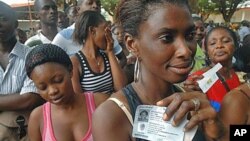Official campaigning has begun in Ivory Coast's long-delayed presidential race, as election officials continue preparations for the vote on October 31st.
This weekend, Ivory Coast's 14 presidential candidates officially hit the campaign trail, raising hopes the country will hold its much-awaited poll at the end of this month, after five years of delays. The election is intended to bring an end to nearly a decade of political crisis after a 2002 civil war split the country between north and south.
Former prime minister and a lead opposition candidate, Alassane Ouattara, launched his campaign Friday at a rally in Abidjan. Addressing the crowd, Mr. Ouattara said this is history. He said it starts "today" at this "precise moment" and will take shape on October 31st for all Ivorians. He said the people of the nation can give a better future to their country by putting the destiny of Ivory Coast in the hands of a man who knows what he is doing.
If elected, Mr. Ouattara promised to continue on the path of reconciliation and form a government composed of diverse political forces and civil society members.
In the capital city of Yamoussoukro, Mr. Ouattara is to take part in a meeting with other leaders of the country's main opposition coalition, including electoral rival and former president Henri Konan Bedie. The group will discuss plans for a shared government, should an opposition candidate win the race.
In the far west of the country, Ivorian President Laurent Gbagbo officially opened his campaign in the town of Man, the site of some of the worst fighting during the civil war. Mr. Gbagbo said he will bring places of work. He said it is because young people do not have work and have been lied to that they took up weapons. A young man who works, he says, does not take up arms.
Mr. Gbagbo also reiterated promises to nearly double the country's cocoa production and build a grinding factory in every cocoa-producing region. Ivory Coast is the world's top cocoa producer, and investors hope the election will clear the way for much-needed reforms to the sector.
In Man, election authorities are distributing voter and identity cards. It is an important, and richly symbolic, step for Ivorians, as the questions of "who is Ivorian" and "who can vote" were at the heart of the civil war and repeated electoral delays.
The head of the card distribution center in Man, Sinaly Diomande, said the ID card is like a diamond for Ivorians. He said that's because once they receive their ID card, their face changes. Diomande said voters feel they have received something worth millions, even though it is just a national Ivorian ID card.
Election observers, however, said much remains to be done before October 31st, including training polling staff and putting in place systems to tabulate results.
Analysts said this first round of polling is likely to be a tight contest between the top three candidates, Gbagbo, Bedie and Ouattara. There are concerns that disputes over results could reignite violence.
The United Nations has begun deploying an additional 500 peacekeepers to Ivory Coast to support the Ivorian force responsible for security during the election. According to Ouagadougou peace accords, half of those 8,000 Ivorian soldiers will come from government troops and the other half from the former rebel factions in the north.




